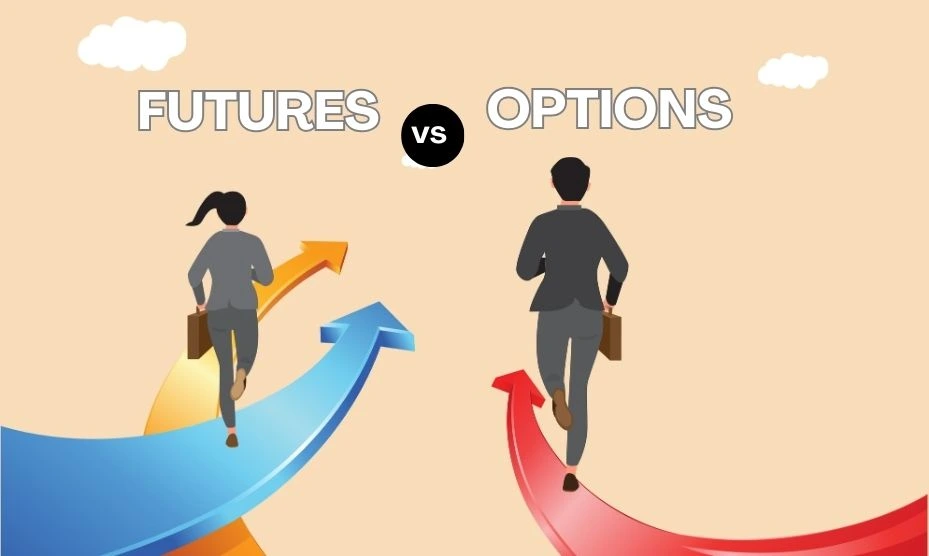
Difference Between Futures and Options
Anyone who has spent some time in the stock market would struggle without knowing the future and options definition. Knowing the definition is an asset, but knowing the difference between futures and options is more valuable. It can be the information that stops you from making a loss-bearing trade!
This blog serves as a guide to newcomers who are struggling to find any Options and Futures difference.
What are Futures and Options?
It's only fair to briefly cover these two before comparing them. Once you know more about them, you can understand the difference between futures and options.
- • Futures Contractions
- • Options Contracts
These legal agreements allow the buying or selling of assets for a pre-set price on a future date.
These contracts grant buyers the ability to trade assets for a price before a date. These rights must not be confused with obligations, which are the opposite!
Comparing options vs futures contracts shows they are quite different, and it's far from ideal to confuse them.
Anyone looking to improve their knowledge and identify them clearly can look into stock market courses for newcomers. These courses can help anyone looking to understand the stock market and how to trade in a way that bears profits!

What is the Difference Between Futures and Options?
If you want a closer look at the difference between options and futures trading, these are the points to consider.
Flexibility & Obligations
Future contracts hold both the buyer and the seller to a commitment, whether buying or selling assets. It means they must complete the obligation or face a costly penalty!
That's not the case for options contracts, which give buyers more flexibility. It gives the buyer extra time to think about executing the contract or not. They even have the right to walk away from the trade if they wish.
Cost Structure
In futures trading, the only costs involved are margin needs and exchange fees. These are lower than the other options and appeal to people looking to restrict extra fees to a minimum.
In options, there is the addition of a non-refundable premium that buyers must give upfront. This extra fee is a noteworthy difference between stock futures and options that can sway decisions.
Risks
A futures trade will suit investors who look to hedge their risks through uncertainty. This contract can subject them to a higher risk than in an options trade.
An options trade will suit an investor looking to make strategic and flexible trades with minimal downside risks. This futures and options difference will help investors decide what fits their needs.
Outcome
Futures can lead to an unlimited profit or loss depending on how well you do technical or fundamental analysis.
It's the same with options trading, which has limitless profit or loss potential. The difference between stock options vs futures outcomes is there is an ability to stop a loss in options by not making the trade.
Leverage & Margins
A future trade will demand a high margin, which can give leverage but also comes with more risk.
An option trade comes with a requirement of a low margin. However, sellers may see higher margin obligations to avert a massive loss.
It is crucial to remember that consulting a SEBI registered research analyst is something you can do if they are still unsure which suits them. The last thing you would want is to risk your money by choosing the wrong one or not using it properly.
Futures vs Options: Which is Better?
Now that you can distinguish between futures and options by looking at their meaning and differences, you are left with the question of which is better for you. You can look at it from the perspective of newcomers and someone more experienced.
- • For Beginners: Options seem the better choice as they offer minimal risks and don't hold anyone to an obligation. To navigate the existing issues, newcomers can find a stock market mentor to help them.
- • For Experienced Traders: Futures offer higher chances of profit, which appeals to skilled market participants.

Similarities Between Futures and Options
Although we have been focusing on futures vs options, here are a few points that connect them.
- • Derivative Instruments - Their values can be found through underlying assets.
- • Leverage - They offer a trader the ability to hold a larger position with smaller investments.
- • Hedging & Speculation - They allow for speculation (gaining from price changes) and hedging (protection from risks).
- • Expiration - Both are subject to expiry, where the contract will cease.
- • Risk Reward - Futures and options have risks, but come with great profit chances. Understanding their complex mechanisms will be vital for success.
Pros and Cons of Futures and Options
Pros of Futures Contracts
- • It allows you to predict the price and lock in on a future price to transact with.
- • They offer greater leverage and can increase your chances of profit.
- • Due to higher liquidity, traders can sell these easily to regain their capital.
Cons of Futures Contracts
- • These contracts come with a possibly high investor deposit margin.
- • There's a chance of a high gain or loss, making them riskier than other options.
- • The markets that use futures contracts are volatile, meaning predicting prices is harder.
Pros of Options Contracts
- • Buyers get flexibility as they have a right but not an obligation to trade.
- • Less capital is required as the premium payments are lower than futures market margin costs.
- • This option comes with the ability to handle risks through hedging and other methods.
Cons of Options Contracts
- • These contracts have an expiry date, and their value diminishes toward this date.
- • Options trading is complicated and entails complex strategies for success.
- • Higher costs may arise, and these can eat away at your profits.
Conclusion
Understanding and comparing futures vs options trading is essential for choosing the right tool for your trading or hedging needs. Both have pros and cons, and you seek expert advice on the stock market and more information about F&O trading.
The core difference between them is one binds the buyer and seller to an obligation, while in the other, there are rights but not obligations. By partnering with an expert or educating yourself, you can find one that suits your ambitions!
Contact us if you want to start exploring these derivatives confidently right now with the help of a trading genius having all the knowledge and experience you may not have.
FAQs about Mutual Funds versus EFTs
-
Are futures better than options?
There is no way to directly compare the two, as the "better one" is purely based on your goals. The latter is best for gaining lee-way while the former gives you more direct exposure. -
How do futures and options differ from traditional stock trading?
A leading traditional trading, futures and options difference is the first one gives ownership, and the other two give you a contract to trade it. -
What industries are the assets traded with futures and options from?
While comparing futures vs options trading, you'll find all the assets belong to the energy, agriculture, and finance industries. It can be appealing as these industries do show the greatest expansion in India. -
How do margin requirements vary for futures and options trading?
A leading options and futures difference arises in margin requirements. Futures need extensive margins to overcome potential losses from the obligation to complete the trade. Meanwhile, options trades see sellers requiring a margin to cover costs, but buyers don't. -
How are futures contracts used for hedging compared to options?
Futures rely on a locked price, eliminating any cost surprises. Option trades give flexibility, as buyers can stop the deal if a loss is imminent. This shows a contrast when it comes to the protection of investor assets in F&O trading.


